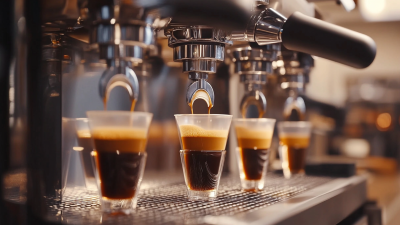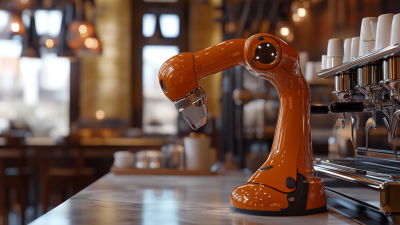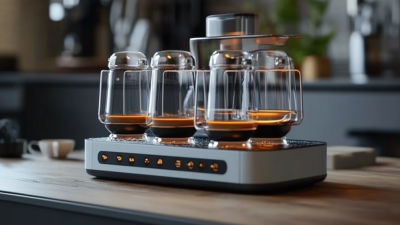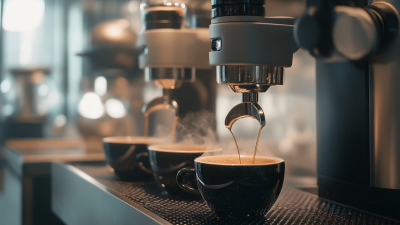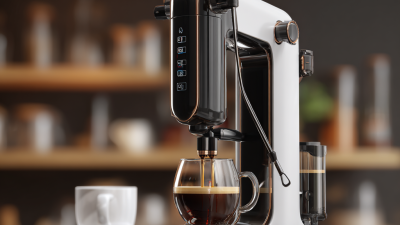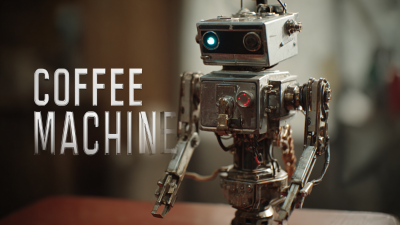In recent years, the concept of a Robot Coffee Shop has emerged as a revolutionary trend within the coffee industry, blending automation with the artisanal experience. According to a report by Statista, the global coffee market is projected to reach $102.15 billion by 2026, with an increasing number of consumers favoring innovative and tech-forward dining experiences.
 The integration of robotics not only enhances operational efficiency but also allows for the customization of drinks and streamlined service. Research from McKinsey & Company indicates that 70% of consumers are willing to try a fully automated coffee service, reflecting a significant shift in consumer preferences towards novelty and convenience. Therefore, creating the ultimate Robot Coffee Shop experience checklist is essential for entrepreneurs looking to capitalize on this burgeoning market, ensuring they cater to tech-savvy coffee lovers while maintaining high standards of quality and customer engagement.
The integration of robotics not only enhances operational efficiency but also allows for the customization of drinks and streamlined service. Research from McKinsey & Company indicates that 70% of consumers are willing to try a fully automated coffee service, reflecting a significant shift in consumer preferences towards novelty and convenience. Therefore, creating the ultimate Robot Coffee Shop experience checklist is essential for entrepreneurs looking to capitalize on this burgeoning market, ensuring they cater to tech-savvy coffee lovers while maintaining high standards of quality and customer engagement.
As the food and beverage industry embraces the transformative power of AI, automated coffee shops are emerging as a key trend. Recent reports indicate that 67% of consumers are interested in experiencing automation in retail environments, particularly in coffee shops where speed and convenience are paramount. This shift mirrors broader consumer preferences, driven by a desire for efficiency and personalized experiences. The integration of advanced technologies enhances not just service speed, but also allows for tailored marketing strategies based on data-driven insights.
In the realm of automated coffee shops, the application of AI spans various functions—from personalized recommendations to intelligent inventory management. A recent trend highlighted the importance of creating seamless interactions where customers can use mobile apps or digital kiosks to customize their orders. Industry forecasts suggest that businesses adopting these technologies could see a 20% increase in customer satisfaction, as patrons appreciate the blend of technology with their coffee experiences. As more consumers seek unique and efficient dining experiences, staying attuned to these trends will be crucial for future success in the automated coffee sector.
As the coffee industry continues to embrace technology, integrating robots into coffee shops is no longer a futuristic concept but a reality transforming consumer experiences. Essential technology features play a crucial role in providing a seamless robot coffee experience. According to the National Coffee Association, 79% of Americans drink coffee, and this increasing demand has led to innovations in service delivery. Robotics not only enhances efficiency but also caters to modern customer expectations for speed and quality.
One key feature is the implementation of artificial intelligence (AI) for personalized customer interactions. AI can analyze customer preferences and tailor recommendations based on past purchases. A recent report by MarketsandMarkets states that the coffee robotics market is projected to grow from $1.5 billion in 2021 to $12 billion by 2026, showcasing how vital these technologies are becoming. Additionally, integrating smart payment systems, such as contactless transactions and mobile wallet options, is essential in delivering a frictionless experience, catering to health-conscious consumers who prioritize convenience and safety.
Another crucial aspect is the use of advanced brewing technologies that maintain consistent quality while speeding up the service process. Automated brewing machines equipped with IoT capabilities can ensure that every cup of coffee meets exacting standards. Studies have shown that customers are willing to pay up to 20% more for a superior coffee experience, indicating that investing in these technologies can yield significant returns. By focusing on these essential technology features, coffee shops can create an unforgettable robotic experience that keeps customers coming back for more.
In the evolving landscape of the coffee shop experience, integrating artificial intelligence and machine learning offers exciting possibilities for personalization in coffee ordering. Imagine stepping into a robot-operated café where your favorite blend is already anticipated based on your past preferences. AI algorithms can analyze previous orders, understand individual taste profiles, and even consider factors like mood, time of day, and seasonal trends. This ensures that each customer feels specially catered to, enhancing their overall experience.
Furthermore, machine learning can continuously improve the personalization process. As customers provide feedback on their orders and preferences, the system refines its recommendations, learning which flavors and ingredients resonate most with each individual. For example, if a customer enjoys oat milk lattes but occasionally opts for something sweeter, the AI can suggest a caramel macchiato next time around. This level of personalization transcends mere convenience; it creates a unique bond between the consumer and the coffee brand, fostering loyalty and a memorable experience at every visit.
| Feature | Description | Importance | Implementation Status |
|---|---|---|---|
| AI-Powered Coffee Recommendations | Utilizing customer preferences to suggest coffee choices | High | In Progress |
| Personalized Ordering System | Customizing the ordering interface based on user habits | High | Not Started |
| Mobile App Integration | Allowing users to order via a mobile application | Medium | Completed |
| Customer Feedback Analysis | Using AI to analyze customer feedback for improvements | High | In Progress |
| Smart Inventory Management | AI-driven system to manage coffee supply and demand | Medium | In Progress |
As the integration of technology becomes ever more prevalent in the service industry, the question arises: should businesses invest in robot baristas or stick with human staff? A cost-benefit analysis reveals significant implications for labor dynamics, particularly in light of recent studies highlighting the efficiency of AI in the workplace. The potential for robot baristas to handle repetitive tasks can lead to increased productivity, allowing human employees to focus on more complex customer interactions.
However, the initial investment in robotic technology can be substantial. Businesses must evaluate whether the long-term savings in labor costs justify the upfront expenses associated with purchasing and maintaining robotic equipment. Moreover, while robots may excel in consistency and speed, the vital human touch in customer service remains irreplaceable. The challenge lies in balancing the benefits of reduced workforce hours, as estimated to save nearly a quarter of private-sector time, against the irreplaceable value of personalized service experiences. This analysis is crucial for coffee shop owners aiming to enhance their customer experience while optimizing operational costs.

The integration of robotics into coffee production has revolutionized quality control and consistency, addressing the challenges faced by traditional coffee shops. According to a report by the International Coffee Organization, coffee consumption has surged by 25% in the last decade, driving the need for higher efficiency in production processes. Automated brewing systems and robotic baristas ensure that every cup maintains the same flavor profile, helping to prevent the variances that can occur with manual brewing. With precision equipment, coffee-to-water ratios can be meticulously measured, while temperature control remains constant, yielding a superior cup of coffee every time.
Moreover, robotics in coffee production can significantly reduce human error, which a survey conducted by Beverage Industry found to be responsible for as much as 30% of inconsistencies in coffee flavor. By employing robotic systems, such as laser-guided grinders and automated espresso machines, coffee shops can achieve a remarkable level of uniformity in their offerings. These advancements not only enhance customer satisfaction but also streamline operational efficiency, allowing businesses to serve more clients while maintaining the highest quality standards. As the coffee industry continues to evolve, the role of robotics will be pivotal in meeting the growing demand for consistency and quality.

